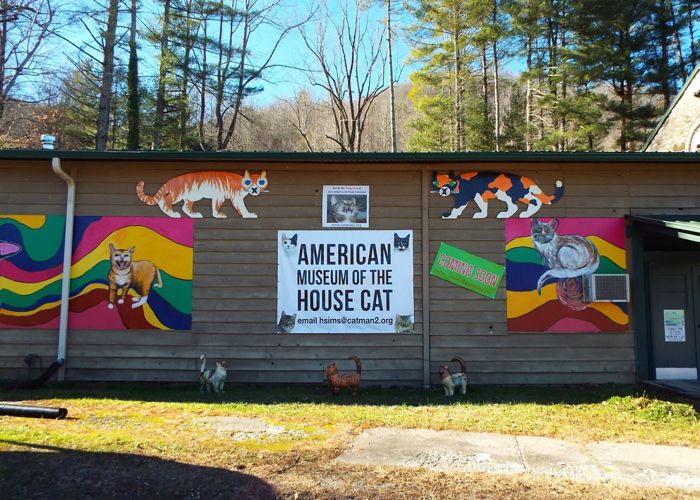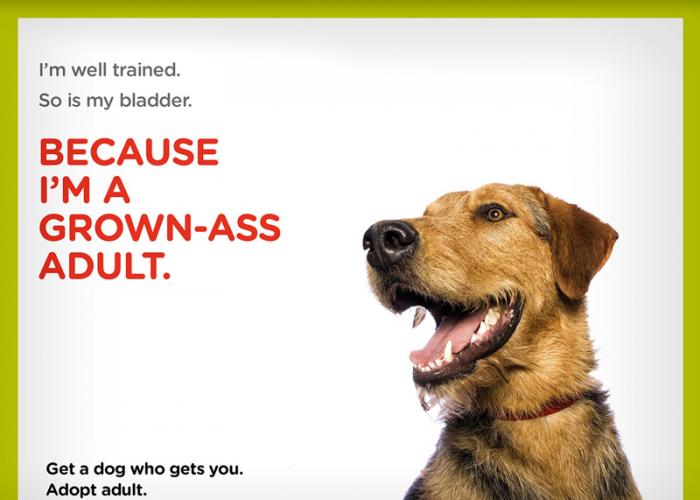Bringing in the troops
Outreach to veterans and active-duty service members can tap a battalion of support
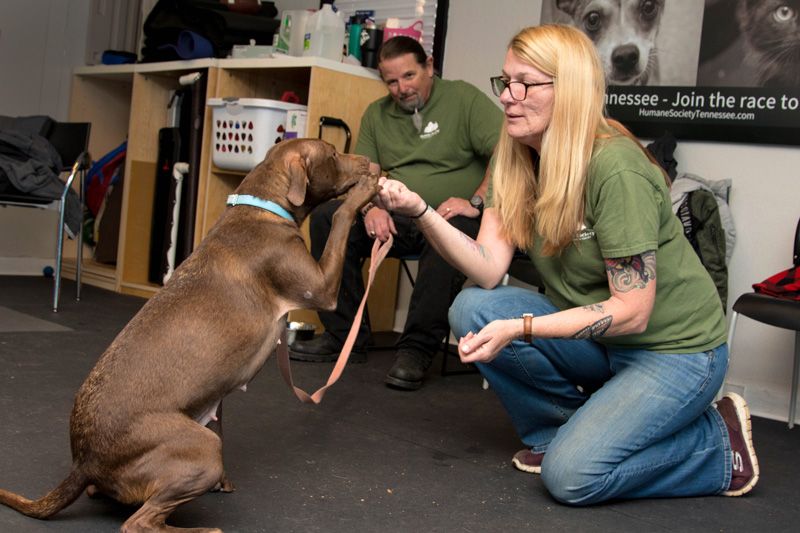
After seven years of service and several overseas deployments, Ashley Morris was diagnosed with post-traumatic stress disorder and left the Air Force in 2013. She returned to her hometown of Knoxville, Tennessee, hoping to recover her mental balance. But a year and a half later, she was still sleeping on her mother’s couch, consumed by feelings of despair and isolation.
Help came from an unexpected place: Just a few miles down the road from the Veterans Affairs outpatient clinic, the Humane Society of the Tennessee Valley had launched Heroes & Hounds, a program that recruits veterans to train shy or unruly shelter dogs. Morris, who learned about the program from a social worker at the clinic, was among its first volunteers.
Over the next year, as she helped Tubby, America, Bella and other dogs learn basic commands and regain their trust in humans, Morris slowly got her life back. “It gave me confidence, and it put me into a social structure,” she says. “I felt like I was doing something important. I missed that from the service.”
It’s the kind of mutual healing that Michelle White envisioned when she first conceived of Heroes & Hounds. White was working as a kennel technician at the Tennessee shelter when she started brainstorming ways to give more personal attention to the harder-to-adopt dogs. White, whose husband served in Vietnam, was also aware of the difficulties former service members can face when they return to civilian life. Both issues were on her mind the night that she turned to her husband and said: “There’s got to be a way of getting these veterans and dogs together.”
The shelter’s leaders loved her proposal for recruiting veterans as apprentice trainers, and with help from a Maddie’s Fund grant, Heroes & Hounds launched in 2015.
White, who is now a certified dog trainer, teaches the veterans about canine behavior and rewards-based training. After shadowing her for several sessions, volunteers are paired with individual dogs and typically spend about four weeks teaching them social skills and basic commands.
“We have dogs who are so terrified that sometimes the veterans just come in and sit with the dogs and get them to open up a bit,” White says. “I feel that’s just as important as the actual training.”
To date, nearly 40 veterans have trained over 150 dogs. Three apprentice trainers have adopted dogs, and several have become regular shelter volunteers. And while the program targets veterans with emotional trauma or addiction issues, it has also brought in former service members who simply want to work with dogs and socialize with other veterans.
Coming from a large military family and working in animal welfare, White suspected that her shelter had a lot to offer veterans and vice versa. Even so, she’s been surprised by the program’s impact on the organization as a whole.
Over the past three years, the shelter’s save rate has increased by 50 percent while the average length of stay for dogs has been cut in half. The work with veterans has also attracted new supporters, like the patriotic-minded tattoo shop nearby that holds regular Heroes & Hounds fundraisers.
“They raised $3,600 for us in three weeks,” White says, and the shelter used the extra money to create a fund to help veterans with veterinary expenses.
It’s just another way, she says, that her organization can thank local veterans for their service to both the country and the community’s homeless animals.
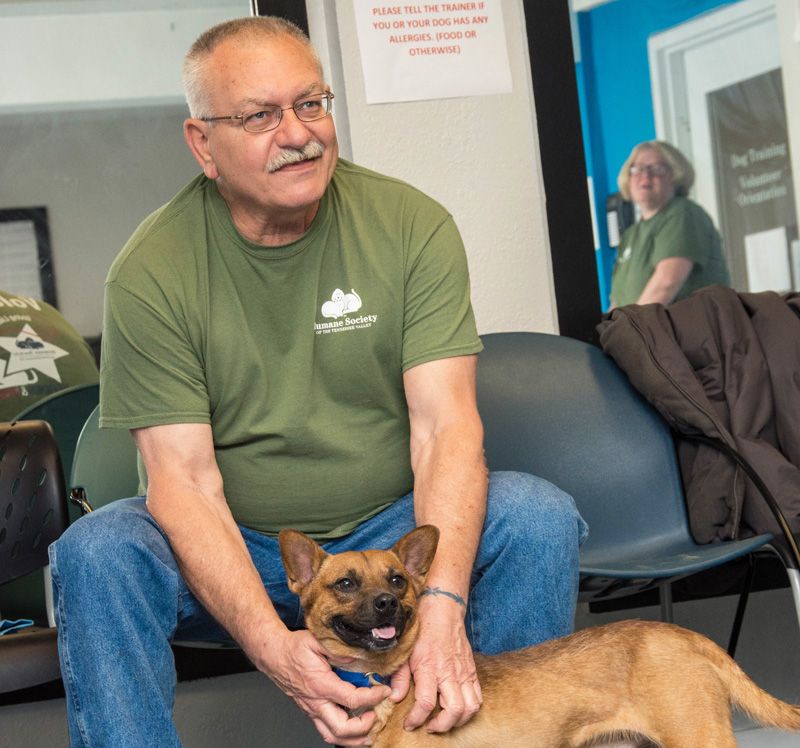
Duty calls
In recent years, with growing awareness of the healing effects of animals on the human psyche, government agencies and nonprofits alike have become more interested in the ways that animals can benefit former service members.
While much of the conversation has focused on providing therapy dogs to veterans with PTSD or other service-related trauma, Bernard Unti, senior policy adviser for the Humane Society of the United States, would like animal welfare organizations to think more broadly about how they can serve veterans.
After all, he points out, not every veteran needs a therapy dog, and not every organization has the time or resources to train dogs in the required skills. As programs like Heroes & Hounds reveal, simply connecting veterans with animals who need them can have a meaningful impact on their quality of life.
That’s the philosophy behind a recent partnership between the VA’s Veterans Health Administration and the HSUS. The goal is to encourage animal welfare organizations to make it easier for veterans to adopt pets and to volunteer their time and talents to help homeless animals.
According to the U.S. Census Bureau, there are nearly 22 million veterans— about 9 percent of the American adult population. Add spouses and other family members to the mix, and that’s a lot of potential volunteers for shelters to recruit for dog training and other volunteer tasks, Unti says, not to mention potential foster homes, donors and adopters.
Enlisting veterans in your shelter’s mission is a matter of filling “complementary needs,” says Beth Zimmerman, founder of Pets for Patriots, a New York based nonprofit that helps veterans adopt at-risk shelter animals. Animal organizations need adopters and volunteers, and veterans by and large bring “a sense of duty” to these roles, she says. “They’re reliable. All the kinds of things you want.”
From the veterans’ perspective, adoption and volunteerism can offer everything from the simple joys of sharing your home with a loyal companion to the satisfaction of helping many animals in need, being around likeminded people and working for the greater good.
“There’s something unique about veterans,” Zimmerman says. “Even when they separate from service, they still want to contribute in some way.”
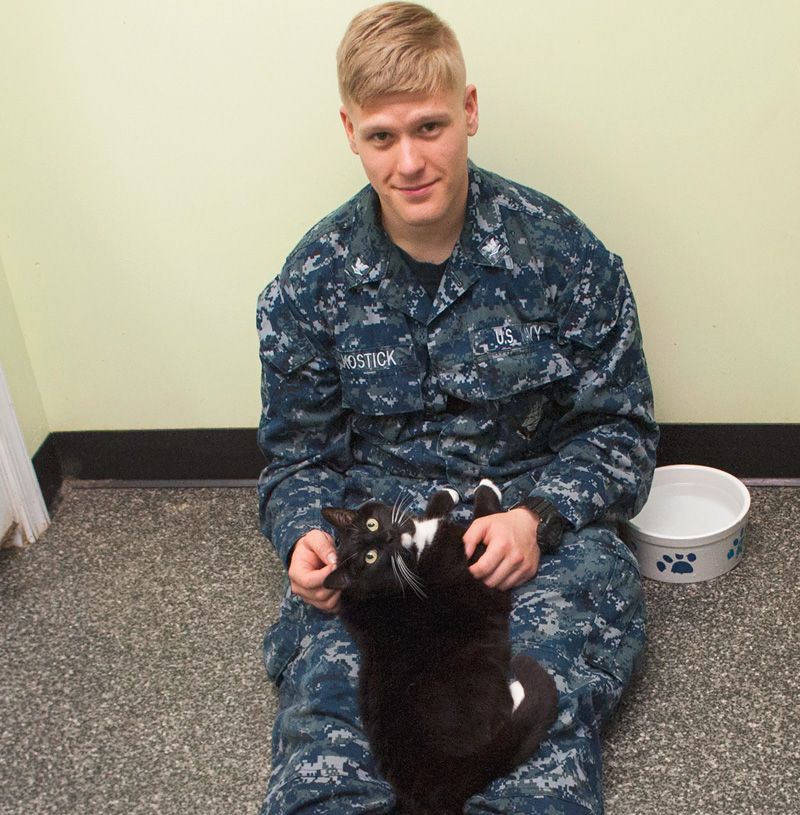
Joining the ranks
To harness this community-service spirit, a good first step is to meet with your local VA office, says White, who consulted staff from the VA and the agency’s nearby outpatient clinic before launching Heroes & Hounds. A VA staffer even visited the shelter, and after he pointed out that service members like structure and clear rules and expectations, White created an orientation process and daily training checklists for volunteers.
Relationships with VA staff members also opened the door for Heroes & Hounds to set up a table at veterans events at a local convention center, where White and her team recruited volunteers and networked with staff from veteran centered nonprofits.
Nonprofits that serve veterans can be another valuable source for program advice and outreach assistance, especially if you plan to target former service members with mental health or substance abuse issues, says Zimmerman. For Heroes & Hounds, White talked with staff at Disabled American Veterans, and counselors from the VA outpatient clinic made a presentation to shelter staff on PTSD and traumatic brain injury, providing advice for handling any problems that might arise.
“If you have a veteran who has an anxiety attack, you have to be able to help them,” White says. “[You] need to know their limitations.”
At the same time, White has found that “veterans help other veterans,” which contributes to smooth operations and reduces the program’s demands on staff.
Two volunteers who took on mentorship roles are Doug Witmer, an Air Force veteran, and his wife, Priscilla, an Army veteran, who live in Oak Ridge,Tennessee. Lifelong dog lovers, the couple learned about Heroes & Hounds in 2015, soon after they completed a canine training course at a local community college.
“Other veterans feel very comfortable with them,” says White. “They’re amazing. They’re funny. They try to make everyone feel comfortable.”
For Witmer, volunteering at the shelter has been a way for him to partially realize a long-deferred dream. When he joined the Air Force in the 1970s, he had his heart set on becoming a canine handler. But Vietnam was over, and “they had more handlers than they had dogs.”
Decades later, spending time with other veterans while helping homeless dogs get adopted feels like the next best thing. “It’s a great little program,” he says. “It benefits the shelter, the vet, the dog and the new owner.”


